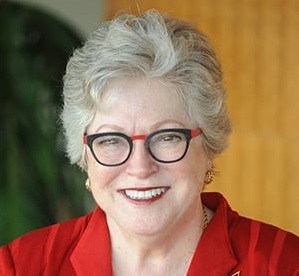The first female professor of theology to be awarded tenure at the Southern Baptist Theological Seminary in Louisville, Kentucky, says her alma mater missed an opportunity to atone for its complicated legacy of slavery when it refused to consider reparations for a historically black college in the same community.
Molly T. Marshall, president of Central Baptist Theological Seminary in Shawnee, Kansas, said in a July 18 opinion article in Baptist News Global that after an extensive study of slave-holding in its early history, Southern Seminary missed a huge opportunity to signal “fruits worthy of repentance” when it refused to donate a tithe of its substantial endowment to Simmons College of Kentucky, a private Historically Black College and University in Louisville’s west end founded in 1879 in part to educate the descendants of former slaves.

Molly T. Marshall
“The administration said it could not do that because Simmons is not officially related to the Southern Baptist Convention and does not teach in accord with its tenets,” said Marshall, who earned her Ph.D. from Southern Seminary in 1983 and became the first tenured theology professor in any of the six seminaries owned by the Southern Baptist Convention in 1988.
She left in 1994, after seminary President Albert Mohler charged her with unspecified teachings outside the seminary’s founding Abstract of Principles and she was told by her dean she could either resign or be fired. Colleagues at the time expressed outrage at her “forced resignation,” calling it “unjustified” and “untimely.”
In Thursday’s op-ed, Marshall described Southern Seminary’s “nit-picking argument” to justify holding on to its wealth while Simmons College continues to struggle as “theological malarkey,” a word for meaningless talk or nonsense that she invoked recently in a gathering of international Baptist scholars while commenting on what she calls a “grave heresy in trinitarian thinking.”
“To speak of one member of the Trinity being eternally subordinated and thereby a model for the subordination of women in marriage is heretical, and I called it theological malarkey,” she elaborated July 18. “Equality is the hallmark of the dynamic movement in the divine life, as centuries of theological reflection have confessed.”
“Eternal subordination of the son” is a relatively new theological argument to support the idea that both males and females bear God’s image but are created for distinct and complementary roles in marriage.
The Council for Biblical Manhood and Womanhood, a chief proponent of the “Complementarian” view, defended it with a quote from the Book of Ephesians “wives, be subject to your own husbands” in an article published July 15.
“Although marriage was established in creation, there is something about the relationship between a Christian husband and wife that, like the church, was not revealed in the Old Testament,” the article says. “In the present age, Christian marriage is intended to provide a visible testimony to the relationship Christ has with his church. But this testimony could only be proclaimed if a believing husband and wife embraced their responsibilities in the marriage relationship.”
“By embracing submission in the marriage relationship, wives have the privilege to provide a visible testimony proclaiming Church’s relationship to Christ,” the article says.
“If a child were to ask, ‘Mom, how does the church relate to Christ?’ The mother should be able to point to her own marriage and say, ‘Son, do you see how I embrace your father’s leadership? That is the way the church relates to Christ,’” it explains.
That view is behind a 1998 amendment to the Baptist Faith and Message – narrowed after progressives and moderates withdrew from the SBC to form the Alliance of Baptists and Cooperative Baptist Fellowship — that made headlines with the proclamation a “wife is to submit herself graciously to the servant leadership of her husband.”
The family article established doctrine that the husband “has the God-given responsibility to provide for, to protect, and to lead his family,” and the wife “to respect her husband and to serve as his helper in managing the household and nurturing the next generation.”
The late Robert Parham, founder of the Baptist Center for Ethics, commented at the time: “They hope to make June Cleaver the biblical model for motherhood, despite numerous biblical references to women who worked outside the home.”
Gender roles have taken on a new urgency in Southern Baptist life with #MeToo-type revelations of mistreatment of women by powerful males and media reports of rampant mishandling of reports of domestic violence and sexual abuse.
Recent tweets by Beth Moore, a popular conservative speaker, teacher and Bible teacher, reignited a decades-old debate within the Southern Baptist Convention about whether or not God can call a woman to preach.
That prompted an open letter, signed by nearly 500 women, asking Moore to clarify her views on homosexuality.
Moore responded July 5 on social media that after three years of prayer and reflection, she reached the conclusion that words she wrote about homosexuality 16 years ago “exceeded Scripture” and “were stopping many from God’s words which follow.”
Previous stories:
Seminary president dismisses eternal subordination in the Trinity as ‘theological malarkey’
Debate over women in Southern Baptist pulpits flares on social media
Related commentary:
Molly T. Marshall | I’m on a mission to rid the world of theological malarkey
